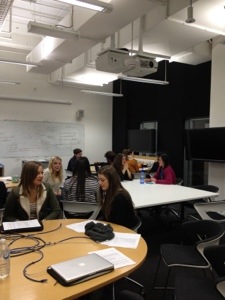Christopher picks up some good points from the first unlecture. Organic, yes. Let’s be blunt here. Some thrive in this sort of experience. Some struggle. Most find their way. I thrive. This is a problem, and a serious one. Because it means I tend to teach to my own cognitive strengths (I’m an associative thinker, no one had to teach me the ‘network’ I got it from day one) which means while I get that others don’t get it, I often miss the big and small things that help others join what to me is already very obviously connected. Not good, for a teacher. (For instance I taught Integrated Media One, a second year subject, last semester. All work produced is documentary and is a very creative engagement with new forms of personal documentary. This was obvious to me, but I never actually said so to the class. So I was sort of surprised to read a blog post from a student this semester in the next subject excited that now they’re working in documentary!)
So one reason for the unlecture is for others, including my teaching peers, to pick my brains, to make me join the bits and pieces. Often things flash together so quickly that they seem to live together, but when slowed down to talk through the connections, they might not be so close after all. Or they are. But the ‘why’ of the connection is left hanging and so one role of the unlecture is to return to and insist on that ‘why’.
Now, Christopher thinks about why he’s studying, and one reason is the piece of paper. Two things. Anecdotal industry evidence is that no recent employee in the film, tv, radio industries has not had a degree in the field (heard this at the recent Australian Screen Production and Education Research Assocation – aka ASPERA – conference). The other thing is that most in industry do not employee you on the basis of that piece of paper. The paper says you might know what to do, but they will rely on word of mouth (reputation), for instance from your teachers, as well as what you’ve done, to judge your worth. And then, the final proof of the pudding, is your ability to do the job. Here, knowing how to be (a media practitioner) trumps specific technical skills. For example, knowing how to edit does not equal knowing how to use Final Cut, and does not equal knowing how to just cut bits of video together. It’s a craft, just as knowing how to make a table is not equal to being able to saw timber and swing a hammer.
Anyway, back to Christopher’s observation of it being an organic learning style. It is organic to the extent it is very orientated to helping you all grow into being active critical thinker makers. Thinkermakers. The organism, if you like, is about growing. Old skool that.
